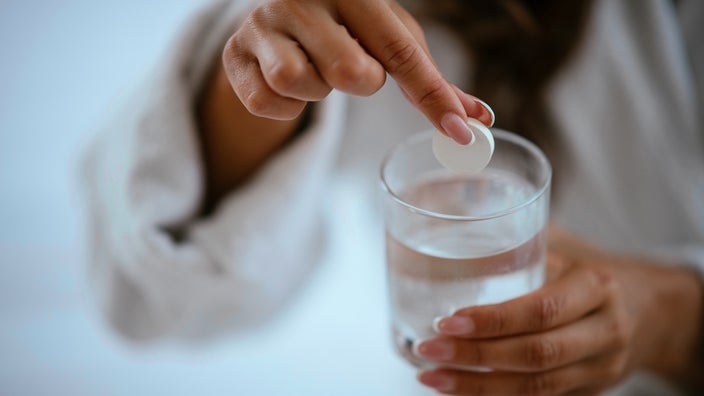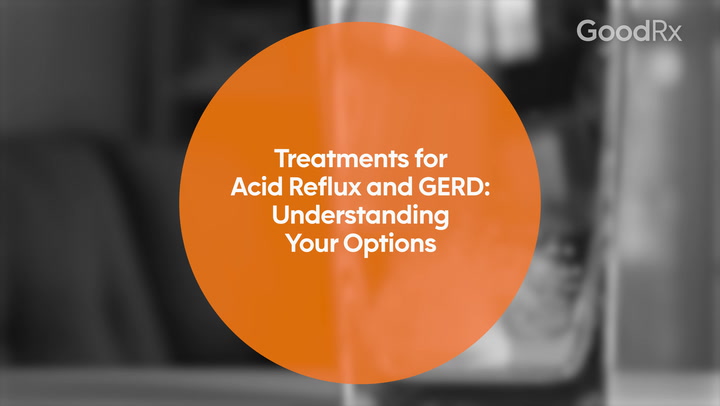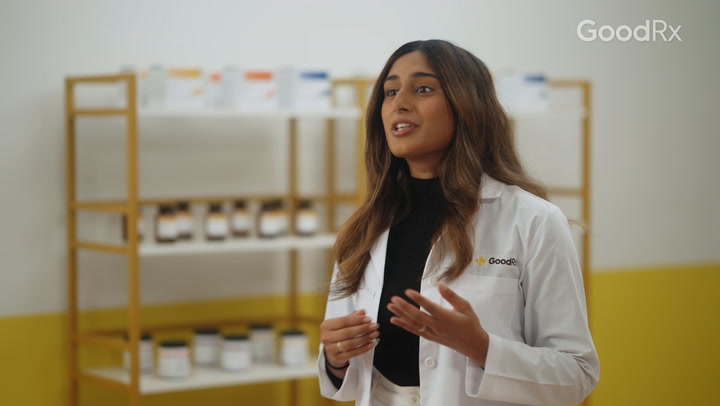
How to Get Rid of Acid Reflux Fast: Medications and Home Remedies
Key takeaways:
Once acid reflux starts, you can use over-the-counter medications, like antacids or H2 blockers, to stop the symptoms fast.
Home remedies, like drinking milk or eating a banana, may also help relieve heartburn symptoms.
If medications don’t relieve your heartburn, you may need medical care. Especially if the pain feels severe.
Access savings on related medications

You may already know how to prevent your heartburn. Many people avoid triggers, like spicy food or alcohol, to help control their symptoms. But what do you do when symptoms start? Acid reflux, more commonly known as heartburn, can be quite uncomfortable. And once the symptoms start, you probably want something that’ll take away the pain quickly.
Fortunately, several evidence-based treatments are designed to help ease symptoms quickly and get you feeling better soon.
Home remedies that can stop heartburn fast
There are many ways you can prevent heartburn before it happens. The following lifestyle and genetic factors can all play a role:
Diet
Body size
Tobacco use
Alcohol consumption
Caffeine intake
Overall health
Search and compare options
But if the symptoms have already started, there are several safe and easy options you can try.
Take a deep breath in and hold it
Anecdotally, some people find relief from heartburn by taking a deep breath in and bear down while holding their breath. This may work because your diaphragm lowers when you take a deep inhalation, pulling the esophagus down with it. When the esophagus is slightly pulled down, it can temporarily reduce the amount of stomach acid leaking back up into it.
Eat a banana slowly
Bananas are often recommended to “neutralize” stomach acid. Some animal research suggests they may even be able to help the body heal from ulcers. Bananas are thought to help coat the lining of the esophagus with a protective layer, making heartburn symptoms less bothersome.
Drink a glass of milk
Just like many over-the-counter (OTC) antacids (which we cover in the next section), milk contains calcium that can help neutralize acidity from heartburn. If you want to try this, opt for skim or low-fat milk. The fat in whole milk might further upset your stomach if you already have heartburn. The same goes for chocolate milk — it’s probably not the best choice if you have heartburn symptoms.
Home remedies that may be risky
There’s plenty of advice out there about how to fix heartburn naturally. Some remedies are worth a try, especially if you don’t want to take medication. But others might carry more risks than benefits. Here are two we don’t recommend:
Drinking baking soda: Baking soda, or sodium bicarbonate, will temporarily neutralize stomach acid and stop heartburn in its tracks. But consuming too much sodium or bicarbonate can be very dangerous for your health, and even fatal at high enough doses.
Drinking apple cider vinegar: Low levels of stomach acid can also trigger heartburn for some people. But there’s no strong scientific evidence that drinking something like apple cider vinegar will help. And drinking acid can harm your teeth and worsen heartburn symptoms.
Eat right for heartburn. Preventing acid reflux starts with avoiding foods more likely to trigger heartburn.
See if your medication is causing heartburn. The use of some common prescription and over-the-counter medications can lead to heartburn.
Don’t ignore your reflux. Long-term reflux can damage your esophagus and give rise to serious medical conditions. Here’s how to prevent it.
Medications that can stop heartburn fast
There are several medications you can use to stop — or at least reduce — acid reflux symptoms after they’ve started. A combination of these may work better than any individual strategy.
If you decide to try more than one medication at a time, wait at least 30 minutes between each one to give it time to work. You don’t want to take more medications than you need. This is because some of these can cause long-term health problems if taken too frequently.
Calcium, magnesium, and aluminum products (antacids)
OTC products containing calcium, magnesium, and/or aluminum work well for treating occasional heartburn. According to Dr. Kevin Cronley, a board-certified gastroenterologist, these antacids are generally the best choice for people who have heartburn symptoms. They’re usually well tolerated and work quickly. Some common brands include:
Tums (calcium carbonate)
Rolaids (calcium carbonate / magnesium hydroxide)
Mylanta (calcium carbonate / magnesium hydroxide / aluminum hydroxide, depending on the formulation)
Some products also contain simethicone, a medicine that relieves gas. Dr. Cronley emphasized that there’s no significant difference between how well different brands work. Choose whichever one you prefer.
Time to symptom relief: 5 minutes or less
Precautions: These medications may not be safe if you have kidney disease or are prone to kidney stones. And if you have other digestive issues, it's important to know that calcium may worsen constipation, while magnesium may worsen diarrhea. Antacids also often interact with other medications, so you may need to space them out.
Famotidine, cimetidine, and nizatidine
Famotidine (Pepcid AC), cimetidine (Tagemet HB), and nizatidine (Axid) are H2 blockers. H2 blockers decrease the amount of acid your stomach produces. This means that even if stomach contents reflux into your esophagus, reduced acid levels make it less likely to cause the burning feeling you associate with heartburn.
Dr. Cronley pointed out that although H2 blockers aren’t as strong as proton pump inhibitors (PPIs), they work better for on-demand use.
Time to symptom relief: Between 30 and 90 minutes. Maximum symptom relief may take up to 3 hours.
Precautions: Some H2 blockers may not be safe if you have kidney or liver disease. They should also be used cautiously with alcohol, since they slow down your body’s ability to clear alcohol.
Omeprazole, pantoprazole, or other proton pump inhibitors
PPIs work similarly to H2 blockers by blocking how much acid your stomach produces. They’re the strongest medications for heartburn. But they work more slowly, so they aren’t the best choice for stopping heartburn symptoms quickly. Because of this, people who suffer from frequent bouts of heartburn often take PPIs daily to prevent symptoms.
Time to symptom relief: You might feel heartburn relief within 1 to 6 hours after taking a PPI. It may take several days for PPIs to reach their maximum effect. That’s why they’re generally best to use as a preventive measure if lifestyle changes haven’t worked.
Precautions: The precautions around PPIs are mainly for people who use them long term (more than 12 weeks). It’s best not to take PPIs for longer than you need, since they affect gut health and increase the risk of certain infections. People with liver disease should check with a healthcare provider for dosage adjustments.
Some studies have also linked long-term PPI use to potential risks, including dementia, kidney problems, and vitamin and mineral deficiencies. However, short-term use appears to be pretty safe.
Take our quiz: Acid reflux medications?
What should you do when you can’t get rid of acid reflux?
If you’ve tried acid reflux remedies but still have heartburn symptoms more than once a week, it’s important to check in with a trusted healthcare professional. Long-term acid reflux can lead to health problems. And it’s also possible that your symptoms are caused by something other than acid reflux.
A healthcare professional can help you pin down potential causes of your symptoms. They can also help you figure out if you need to start regular heartburn medication.
Get checked out right away if you’re having any of the following serious symptoms:
Vomiting up blood
Passing bloody, black, or tar-like stools
Unintentional weight loss
Severe chest pain or pressure
Pain while swallowing food or liquids
Difficulty swallowing
Lightheadedness or dizziness
Shortness of breath
Frequently asked questions
Many people use the terms “acid reflux” and “heartburn” interchangeably. But they aren’t exactly the same thing. Heartburn is one of the common symptoms of acid reflux. Acid reflux is when stomach acid flows back into the esophagus. But some people with acid reflux don’t experience heartburn.
Other symptoms of acid reflux include:
Difficulty swallowing
Cough and sore throat
A sour taste in your mouth or bad breath
Nausea
Bloating or burping
Even if you don’t experience heartburn, it’s important to treat acid reflux before it leads to health complications.
Heartburn can last anywhere from minutes to a few hours, depending on the cause and the individual. Many people find relief in less than an hour by changing positions, loosening clothing, or taking something. If your heartburn lasts longer than several hours without any relief, it’s best to seek medical attention for evaluation.
It’s common to experience heartburn at night. This is because laying down makes it easier for stomach contents to travel up into the esophagus. If this happens, try one of the remedies mentioned above. One of the fastest solutions is to sit up. If you’re already in bed for sleep, prop up your torso with a few extra pillows.
If nighttime heartburn happens frequently, try raising the head of your bed by 6 to 10 inches with a wedge under the mattress. It may also help to:
Eat dinner at least 3 hours before bedtime
Avoid any trigger foods at dinner
Skip alcohol in the evening
Wear loose clothing during and after dinner
The bottom line
Acid reflux and heartburn can be unpleasant and painful. When it starts, there are things you can do right away to get rid of your symptoms fast. Your best bet is usually to try a short-acting medication like an antacid. If that doesn’t work, there are plenty of other remedies you can try as well. But don’t ignore heartburn if it doesn’t go away or keeps coming back. In these circumstances, it’s best to see your healthcare provider.
Why trust our experts?


References
Goel, R. K., et al. (1986). Anti-ulcerogenic effect of banana powder (Musa sapientum var. paradisiaca) and its effect on mucosal resistance. Journal of Ethnopharmacology.
Heidelbaugh, J. J., et al. (2013). Proton pump inhibitors and risk of vitamin and mineral deficiency: Evidence and clinical implications. Therapeutic Advances in Drug Safety.
Herdiana, Y., et al. (2023). Functional food in relation to gastroesophageal reflux disease (GERD). Nutrients.
Imhann, F., et al. (2015). Proton pump inhibitors affect the gut microbiome. Gut.
Jaynes, M., et al. (2018). The risks of long-term use of proton pump inhibitors: A critical review. Therapeutic Advances in Drug Safety.
Kines, K., et al. (2016). Nutritional interventions for gastroesophageal reflux, irritable bowel syndrome, and hypochlorhydria: A case report. Integrative Medicine.
Lehault, W. B., et al. (2017). Review of the long-term effects of proton pump inhibitors. Federal Practitioner.
Moody, D. E., et al. (2018). The inhibition of first-pass metabolism of ethanol by H2-receptor antagonists: A tabulated review. Expert Opinion on Drug Safety.
National Capital Poison Center. (n.d.). My child got into the baking soda: Risks and treatment.
Pourhadi, N., et al. (2023). Proton pump inhibitors and dementia: A nationwide population-based study. Alzheimer’s and Dementia.
Schulz, R. M., et al. (2022). Effectiveness of nutritional ingredients on upper gastrointestinal conditions and symptoms: A narrative review. Nutrients.
Shin, J. M., et al. (2013). Pharmacokinetics and pharmacodynamics of the proton pump inhibitors. Journal of Neurogastroenterology and Motility.
Weersink, R. A., et al. (2018). Safe use of proton pump inhibitors in patients with cirrhosis. British Journal of Clinical Pharmacology.
Welage, L. S., et al. (2000). Evaluation of omeprazole, lansoprazole, pantoprazole, and rabeprazole in the treatment of acid-related diseases. Journal of the American Pharmaceutical Association.
Wu, C. C., et al. (2023). Proton pump inhibitors and risk of chronic kidney disease: Evidence from observational studies. Journal of Clinical Medicine.
Zheng, Z., et al. (2008). Lifestyle factors and risk for symptomatic gastroesophageal reflux in monozygotic twins. Gastroenterology.

























